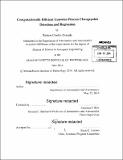| dc.contributor.advisor | Jonathan P. How. | en_US |
| dc.contributor.author | Grande, Robert Conlin | en_US |
| dc.contributor.other | Massachusetts Institute of Technology. Department of Aeronautics and Astronautics. | en_US |
| dc.date.accessioned | 2014-10-08T15:21:42Z | |
| dc.date.available | 2014-10-08T15:21:42Z | |
| dc.date.copyright | 2014 | en_US |
| dc.date.issued | 2014 | en_US |
| dc.identifier.uri | http://hdl.handle.net/1721.1/90670 | |
| dc.description | Thesis: S.M., Massachusetts Institute of Technology, Department of Aeronautics and Astronautics, 2014. | en_US |
| dc.description | Cataloged from PDF version of thesis. | en_US |
| dc.description | Includes bibliographical references (pages 150-160). | en_US |
| dc.description.abstract | Most existing GP regression algorithms assume a single generative model, leading to poor performance when data are nonstationary, i.e. generated from multiple switching processes. Existing methods for GP regression over non-stationary data include clustering and change-point detection algorithms. However, these methods require significant computation, do not come with provable guarantees on correctness and speed, and most algorithms only work in batch settings. This thesis presents an efficient online GP framework, GP-NBC, that leverages the generalized likelihood ratio test to detect changepoints and learn multiple Gaussian Process models from streaming data. Furthermore, GP-NBC can quickly recognize and reuse previously seen models. The algorithm is shown to be theoretically sample efficient in terms of limiting mistaken predictions. Our empirical results on two real-world datasets and one synthetic dataset show GP-NBC outperforms state of the art methods for nonstationary regression in terms of regression error and computational efficiency. The second part of the thesis introduces a Reinforcement Learning (RL) algorithm, UCRL-GP-CPD, for multi-task Reinforcement Learning when the reward function is nonstationary. First, a novel algorithm UCRL-GP is introduced for stationary reward functions. Then, UCRL-GP is combined with GP-NBC to create UCRL-GP-CPD, which is an algorithm for nonstationary reward functions. Unlike previous work in the literature, UCRL-GP-CPD does not make distributional assumptions about task generation, does not assume changepoint times are known, and does not assume that all tasks have been experienced a priori in a training phase. It is proven that UCRL-GP-CPD is sample efficient in the stationary case, will detect changepoints in the environment with high probability, and is theoretically guaranteed to prevent negative transfer. UCRL-GP-CPD is demonstrated empirically on a variety of simulated and real domains. | en_US |
| dc.description.statementofresponsibility | by Robert Conlin Grande. | en_US |
| dc.format.extent | 160 pages | en_US |
| dc.language.iso | eng | en_US |
| dc.publisher | Massachusetts Institute of Technology | en_US |
| dc.rights | M.I.T. theses are protected by copyright. They may be viewed from this source for any purpose, but reproduction or distribution in any format is prohibited without written permission. See provided URL for inquiries about permission. | en_US |
| dc.rights.uri | http://dspace.mit.edu/handle/1721.1/7582 | en_US |
| dc.subject | Aeronautics and Astronautics. | en_US |
| dc.title | Computationally efficient Gaussian Process changepoint detection and regression | en_US |
| dc.type | Thesis | en_US |
| dc.description.degree | S.M. | en_US |
| dc.contributor.department | Massachusetts Institute of Technology. Department of Aeronautics and Astronautics | |
| dc.identifier.oclc | 890462047 | en_US |
